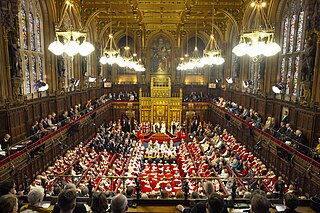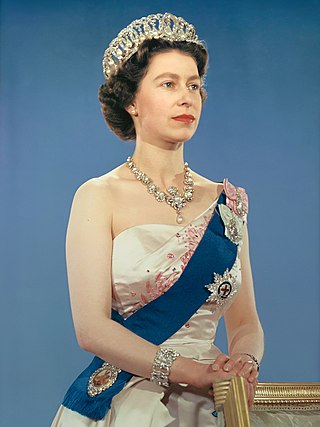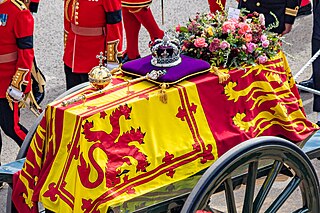
Buckingham Palace is a royal residence in London, and the administrative headquarters of the monarch of the United Kingdom. Located in the City of Westminster, the palace is often at the centre of state occasions and royal hospitality. It has been a focal point for the British people at times of national rejoicing and mourning.

Balmoral Castle is a large estate house in Aberdeenshire, Scotland, and a residence of the British royal family. It is near the village of Crathie, 9 miles (14 km) west of Ballater and 50 miles (80 km) west of Aberdeen.

The prime minister of the United Kingdom is the head of government of the United Kingdom. The prime minister advises the sovereign on the exercise of much of the royal prerogative, chairs the Cabinet and selects its ministers. As modern prime ministers hold office by virtue of their ability to command the confidence of the House of Commons, they sit as members of Parliament. The current prime minister is Rishi Sunak of the Conservative Party, who assumed the office on 25 October 2022.

The Privy Council is a formal body of advisers to the sovereign of the United Kingdom. Its members, known as privy counsellors, are mainly senior politicians who are current or former members of either the House of Commons or the House of Lords.

The monarchy of the United Kingdom, commonly referred to as the British monarchy, is the form of government used by the United Kingdom by which a hereditary monarch reigns as the head of state, with their powers regulated by the British Constitution. The term may also refer to the role of the royal family within the UK's broader political structure. The current monarch is King Charles III, who ascended the throne on 8 September 2022, upon the death of his mother, Queen Elizabeth II.

The deputy prime minister of the United Kingdom is the second highest ranking minister of the Crown and a member of the British Cabinet. The title is not always in use and prime ministers have been known to appoint informal deputies without the title of deputy prime minister. The incumbent deputy prime minister is Oliver Dowden who also serves as Chancellor of the Duchy of Lancaster and Secretary of State in the Cabinet Office.

The Lord President of the Council is the presiding officer of the Privy Council of the United Kingdom and the fourth of the Great Officers of State, ranking below the Lord High Treasurer but above the Lord Keeper of the Privy Seal. The Lord President usually attends and is responsible for chairing the meetings of the Privy Council, presenting business for the approval of the Sovereign. In the modern era, the incumbent is by convention always a member of one of the houses of Parliament, and the office is normally a Cabinet position.

The Lord Chancellor, formally titled Lord High Chancellor of Great Britain, is the highest-ranking traditional minister among the Great Officers of State in Scotland and England in the United Kingdom, nominally outranking the prime minister. The lord chancellor is appointed by the sovereign on the advice of the prime minister. Prior to the union of England and Scotland into the Kingdom of Great Britain, there were separate lord chancellors for the Kingdom of England and the Kingdom of Scotland. There were Lord Chancellors of Ireland until 1922.

The president of the Board of Trade is head of the Board of Trade. A committee of the Privy Council of the United Kingdom, it was first established as a temporary committee of inquiry in the 17th century, that evolved gradually into a government department with a diverse range of functions. The current holder of the post is Kemi Badenoch, who is concurrently the secretary of state for business and trade.

The State Opening of Parliament is a ceremonial event which formally marks the beginning of each session of the Parliament of the United Kingdom. At its core is His Majesty's "gracious speech from the throne", which is read by the monarch but written by HM Government. In the speech the monarch gives notice of forthcoming state visits, before setting out the government's legislative programme for the new parliamentary session. No business of either House of Parliament can proceed until the Sovereign’s speech has been delivered.

The governor of Northern Ireland was the principal officer and representative in Northern Ireland of the British monarch. The office was established on 9 December 1922 and abolished on 18 July 1973.
Investiture is a formal installation or ceremony that a person undergoes, often related to membership in Christian religious institutes as well as Christian knighthoods or damehoods, in addition to government offices.
The dissolution of the Parliament of the United Kingdom occurs automatically five years after the day on which Parliament first met following a general election, or on an earlier date by royal proclamation at the request of the prime minister. The monarch's prerogative power to dissolve Parliament was revived by the Dissolution and Calling of Parliament Act 2022, which also repealed the Fixed-term Parliaments Act 2011. By virtue of amendments made by the Dissolution and Calling of Parliament Act to Schedule 1 to the Representation of the People Act 1983, the dissolution of Parliament automatically triggers a general election.

Elizabeth II was Queen of the United Kingdom and other Commonwealth realms from 6 February 1952 until her death in 2022. She was queen regnant of 32 sovereign states over the course of her lifetime and remained the monarch of 15 realms by the time of her death. Her reign of 70 years and 214 days is the longest of any British monarch or female monarch, and the second longest verified reign of any monarch of a sovereign state in history.

In the United Kingdom, state funerals are usually reserved for monarchs. The most recent was the state funeral of Queen Elizabeth II on 19 September 2022.

Monarchy: The Royal Family at Work is a fly on the wall documentary TV series made by the BBC and RDF Media which follows the British Royal Family over the course of a year.
Operation London Bridge was the funeral plan for Queen Elizabeth II. The plan included the announcement of her death, the period of official mourning, and the details of her state funeral. The plan was created as early as the 1960s and revised many times in the years before her death in September 2022.

In the United Kingdom, the Great Officers of State are traditional ministers of the Crown who either inherit their positions or are appointed to exercise certain largely ceremonial functions or to operate as members of the government. Separate Great Officers exist for England and Wales, Scotland, and formerly for Ireland, though some exist for Great Britain and the United Kingdom as a whole.
A list of events relating to politics and government in the United Kingdom during 2022.

Elizabeth II, Queen of the United Kingdom and the other Commonwealth realms, died on 8 September 2022 at Balmoral Castle in Scotland, at the age of 96. Elizabeth's reign of 70 years and 214 days was the longest of any British monarch. She was succeeded by her eldest son, Charles III.













